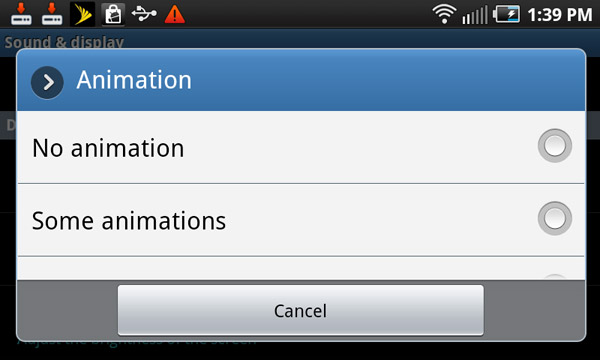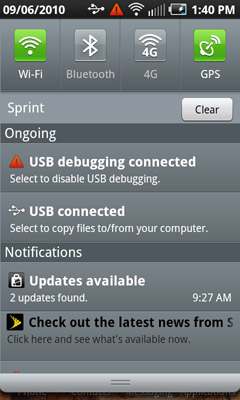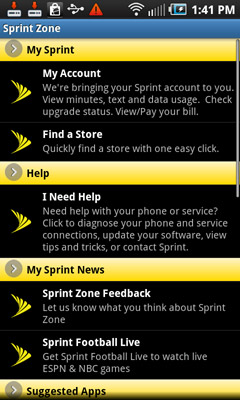Samsung Epic 4G Review: The Fastest Android Phone
by Anand Lal Shimpi on September 6, 2010 5:28 PM EST- Posted in
- Smartphones
- Samsung
- Epic 4G
- Gadgets
- Mobile
The Smoothest Android UI To Date
I’ve tried the big names. The G1, Droid X, HTC Incredible, EVO 4G, and even newcomers like the Dell Streak. The one thing all Android phones I’ve laid my hands on have in common is varying degrees of a choppy UI. Some are worse than others but they all exhibited it. The choppiness is really apparent when compared to the iPhone. Scrolling through apps, or down web pages would just feel choppy - as if we weren’t running at a smooth or constant frame rate. I had no idea if it was an Android thing, a driver issue or something else entirely. The fact that it varied so much depending on hardware/software meant that there was no easy solution.
For example, the HTC Incredible got pretty close simply by ditching a number of animations. In fact, there’s even a setting within Android to do this:

The Galaxy S did it the old fashioned way though: a lot of software tuning and faster hardware.
Tap the icon in the lower right corner to bring up a list of applications and swiping through them feels just like an iOS device. It’s smooth. There are occasional dropped frames but it’s rare. Scrolling down web pages is still choppy though.
Remember me talking about Samsung learning from Apple? These are the learnings. Even the app list in Samsung’s custom TouchWiz Android UI mimics iOS. You get pages of apps that you flip through left-to-right, there’s no vertical scrolling.

You still get multiple home screens, but swiping between them is fairly smooth as well. Occasionally I’ll get a hiccup or two but overall, it’s the best I’ve seen on an Android phone.
Samsung clearly put a lot of attention to making this aspect of the Epic 4G as Apple-like as possible, and I believe it delivered. I’d say you get around 90 - 95% of the scrolling feel of the iPhone 4, which is to say that it’s close enough.
The polish extends beyond the smoothness of the UI. Individual apps feel more appliance like and less PC like. The dialer UI is very clean and does sensible things like automatically look up phone numbers in your contact list as you dial them in - this applies to both number matching as well as T9-like text matching. The camera app hides unused customization options unless you ask to see them. Samsung modified the notifications pulldown to include a widget that lets you enabled disable WiFi, 4G, Bluetooth and GPS. It’s the little things like these that really make Samsung’s TouchWiz UI a friendlier face on Android.

There’s a fine line between polish and oversimplification however, and in some areas Samsung does cross it. Samsung’s custom Android UI does things like removes all ability to see percentage of battery life remaining, all you get is a visual indication but nothing more. Even going into the Android battery info menu you can’t get that level of detail, you’ll have to turn to a third party app.
Samsung also removed all support for recording call length in your call log. On other Android phones you have a record of how long each phone call lasted, but Samsung removed it entirely. It keeps the UI ultra clean, but at the expense of functionality.

Sprint does its unnecessary evil and equips the Epic 4G with Sprint spam right out of the box. You'll occasionally get a Sprint icon in the notification bar telilng you about the latest news from Sprint. Tapping on it will bring you to the Sprint Zone (pictured above).

The Epic 4G’s icons are all custom designed and they all feel very modern and web-2.0-ey. You get bold colors and big boxes around each icon that make the app launcher feel like a grown up toy rather than a PC OS shrunk into a smartphone. The downside is that the individual app icons aren’t very memorable or distinguishable from one another. Colors are great for organization, but too many and you lose all semblance of order.
Ultimately if you’re trying to give someone a more iOS-like experience on an Android phone, Samsung gets the job done. Its custom skinning is the closest you can get to iOS without giving up the flexibility of Android.










93 Comments
View All Comments
Ethaniel - Monday, September 6, 2010 - link
I have also noticed that all Android phones out there do some kind of "breakdancing". You think it has something to do with Android, but I think it has something to do with Java. Now, Java devs will probably want to eat my brain after this... but Java sucks. Big time. Making Android's UI based on Java was a bad, bad, really bad move. About four three time slower than C++, it demands more memory... completely inadequate for a mobile environment.meatless - Monday, September 6, 2010 - link
It's sad, the prevalence of Java FUD to this day. It's also bad to blame Java (the syntax), as you are unnecessarily conflating the Dalvik VM with desktop VMs such as Sun's.C++ is fast, sure, but there is a lot more to designing a platform than speed, and the Dalvik VM is more than fast enough. iOS's Obj-C implementation is also not C++ fast, but who complains?
taltamir - Tuesday, September 7, 2010 - link
1. both Javas are shit2. There is more to a platform then speed... but when you are designing a platform starved for processing power and that needs to sip electricity then it makes a huge difference.
Penti - Tuesday, September 7, 2010 - link
Most of the platform are actually C/C++ libraries and programs, where you glue your app in isn't that relevant. You need a framework for any mobile phone platform, but the resources that framework glues into thats where a lot of performance comes from and it's in C/C++. It's better to have an accelerated framework running on a virtual machine then an unaccelerated C++ one. Rendering of menus and such would be slower on the last one. Besides on Symbian it's QT-framework that rules now, not some ultra customized embedded framework. Memory requirements have gone up there too, but capacity have grown even more. Besides nobody wanted to write mobile apps to some badly designed and awkward C++ framework and API. Java syntax was a good choice therefor.taltamir - Monday, September 13, 2010 - link
the fact that there are more considerations than just programming language when it comes to power and speed are obvious, as is that you could make a java app thats faster than a C++ app.Neither make java a good choice.
BTW, I didn't personally comment about the issue of jerkiness, I was going on a tangent as a reply to what meatless said (specifically the socalled "java FUD")
zizagoo - Monday, September 6, 2010 - link
It's an Android problem. The cause of the "jerkiness" is that unlike iOS/WebOS/WP7, Android doesn't have a gpu accelerated ui. They supposedly did this because the G1 wouldn't support it at the time.http://code.google.com/p/android/issues/detail?id=...
Gingerbread, which is supposedly showcased next month, should fix this.
deputc26 - Monday, September 6, 2010 - link
Thankyou! this is exactly it, give the man a medal. I don't know why Anandtech never mentions this. It should be ubiquitous knowledge in the android community.meatless - Monday, September 6, 2010 - link
Also, the 3-4X speed difference on non-mobile platforms is greatly exaggerated. I always find http://shootout.alioth.debian.org/ a fun and FUD-free site.Iksy - Tuesday, September 7, 2010 - link
Greatly exagerated? That site shows a 2.3x speed difference and it's comparring against Sun's fastest most optimizing version against g++. The unoptimized version is over 20x slower, you'll find it near the bottom of the list for compares. I do find it interesting that while they're satisfied with using an open source C (gnu) compiler, they do not include the open source java interpreter. They also do not include the Intel C compiler, even though they easily could and include the Intel Fortran compiler.In other words, is still in the ball park so say Java is 3-4x slower than the equivalent c++ code.
dvinnen - Tuesday, September 7, 2010 - link
Wait, so the Java syntax is what is slowing down Android? Because it doesn't run Java, it runs Dalvik.I would also like to see evidence that C++ is 4 times faster. Not saying Java is faster but it is fast enough. I say that as a Java developer who doesn't like the language and would rather use slower languages like Python